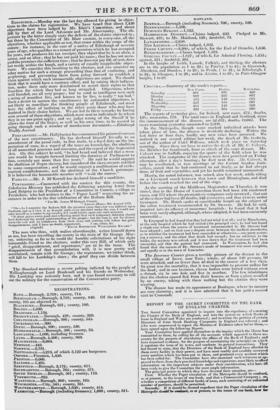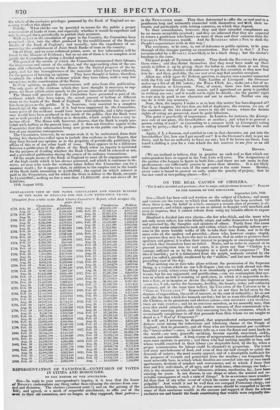REPORT OF THE SECRET COMMITTEE ON THE BANK OF ENGLAND
CHARTER.
THE Secret Committee appointed to inquire into the expediency of renewing- the Charter of the Bank of England, and into the system on which Banks of Issue iu England and Wales are conducted ; and to whom the petition of certain Directors of Joint Stock Banking Companies in England IVBS referred ; and who were empowered to report the Minutes of Evidence taken before them,— .have agreed upon the following Report. Your Committee have applied themselves to the inquiry which the House has committed to them, by calling for all the accounts which appeared to them ne- cessary for the purpose of elucidating the affairs of the Bank of England ; and have examined evidence, for the purpose of ascertaining the principles on which it regulates the issue of its notes, and conducts its general transactions. They feel bound to state, that the Directors of the Bank of England have afforded to them every facility in their power, and have most readily and candidly answered every question which has been put to them, and produced every account which has been called for. The Committee have also examined such witnesses as ap- peared to them, from their practical knowledge and experience, most likely to afford information on the important subjects under their consideration, who hair.; alt been ready to give the Committee the most ample information. The principal points to which they have directed their attention, are— First. Whether the Paper circulation of the Metropolis should be confined, as at present, to the issues of one bank, and that a Commercial Company-; or, whether a competition of different banks of issue, each consisting of an unlimited number of partners, should he permitted. Secondly. If it should be deemed expedient that the Paper circulation of the Metropolis shook:Ike confined, as at present, to the issues of one bank, bow kw
the whole of the exclusive privileges possessed by the Bank of England are ne- cessary to effect this object.
Thirdly. What checks can be provided to secure for the public a proper management of banks of issue, and especially whether it would be expedient and safe to compel them periodically to publish their accounts. With respect to the circulation of paper in the Country, the Committee have examined - lust, into the effect produced by the establishment of the Branch Banks of the Bank of England ; and secondly, into the expediency of en- courreine. the establishment of Joint Stock Banks of issue in the country.
On alCthese, and on some collateral points, more or less information will be found in the Minutes of Evidence; but on no one of them is it so complete as to justify the Committee in giving a decided opinion..
The period of the session at which the Committee commenced their labours, the importance and extent of the subject, and the approaching close of the ses- sion, will sufficiently account to the House for the limited progress of the in- quiry, and for the incompleteness of the materials which have been collected, for the purpose of forming an opinion. They have thought it better, therefore, to salinnt the whole of the evidence which they have taken, with a very few exceptions, to the consideration of the House. In their opinion, no public inconvenience will arise from this publication. The only parts of the evidence which they have thought it necessary to sup- press, are those which relate merely to the private interests of individuals.
The House will perceive that the Committee have presented as part of the evidence which they have taken, the actual amount of bullion at different times in the hands of the Bank of England. This information has never be- fore been given to the public. It is, however, very essential to a complete knowledge of the subject ; and if it had been suppressed by the Committee, many parts of the evidence would have been unintelligible, and a false impres- sion would have been produced in the minds of the public, that the Bank were not as well provided with bullion as is desirable, which might have a very in- jurious effect. The House will, however, observe, that the Bank is amply pro- vided with bullion at the present time; and it does not therefore appear to the Committee that this information being now given to the public can be produc- tive of any injurious consequences. The Committee, however, by no means wish it to be understood, from their having felt themselves called upon to include this evidence in their Report, that they have formed any opinion as to the propriety of periodically publishing the affairs of this or of any other bank of issue. There appears to be a difference between a publication of the affairs of the Bank when an inquiry is instituted for the purpose of deciding whether the Bank Charter shall be renewed or not, and a periodical publication during the course of its ordinary transactions. Of the ample means of the Bank of England to meet all its engagements, and of the high credit which it has always possessed, and which it continues to de- serve, no man who reads the evidence taken before this Committee can for a moment doubt • for it appear that, in addition to the surplus rest in the hands of the Bank itself, amounting to 2,880,0001., the capital on which interest is paid to the Proprietors, and for which the State is debtor to the Bank, amounts to 14,553,0001., making no less a sum than 17,433,000/. over and above all its liabilities.
Ilth August 1832.



























 Previous page
Previous page